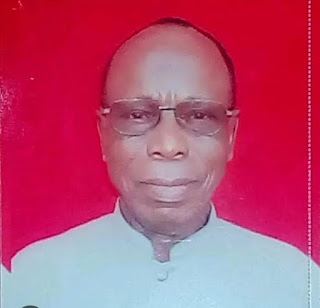SAD: THE FIRST PROFESSOR OF IGBO LANGUAGE BOWS OUT, READ HIS LIFETIME SCORE CARDS
THE SCEPTRE BOWS: THE PASSING OF THE FATHER OF MODERN IGBO STUDIES
In the whirlwind of the struggle to stay afloat above the realities of today’s Nigeria, where a tumultous volcano of clashes of cultures have given rise to the molten magma of varied values, I got the shocking news of the passing of the father of modern Igbo Studies and the first professor of Igbo language in the world, Okankuzi (Professor) Innocent Uzoma Nwadike. The first and mighty chapter of the systematization of the profundity of the Igbo language and gatekeeping of Igbo Literature suddenly closed. It hit me like the ringing tone of a Tyson Fury punch to the head. It dawned on my scholarly consciousness that an entire library had vanished from tangibles into intangibles, from the ephemeral into the eternal truth of existence.
I had the opportunity to come under the tutelage of Okankuzi Nwadike in 2011 when I registered for the course, IAS 511: African Languages and Literature, as part of the requirements for a Master’s Degree in African Studies. During the lectures, I learnt from him that before 1933, almost all of Igbo literature was orally transmitted. The few exceptions were translations of English texts (such as The Pilgrim’s Progress; Arabian Nights, Tales from Shakespeare etc) into Igbo for moral teachings in early churches in Igbo land and few other publications. In 1933, Pita Nwana’s Omenṷkọ was published and it became the forerunner of the Igbo novel. As I looked at the last page of an article (Omenṷkọ and Ala Bingo: Their Impact on Igbo Literature) written by Prof. Nwadike, I saw his words, “What have you as an individual out there contributed toward the feeding and nurturing of Igbo studies? Will your contributions come when you will have left the shores of this transitory Earth? To delay is dangerous…. The greatest legacy which man can bequeath to posterity is his intellect as recorded in books. Great minds never die.”
The quoted words above are flames to a healthy Igbo mind. Prof. Nwadike, who was the writer of those words contributed many texts to Igbo literature before he passed to the great beyond.
Needless to say that I made the A grade in the course Prof. Nwadike taught me, which contributed to my Cumulative Grade Point Average of 4.35 for my Master’s Degree in African Studies.
Okankuzi (Professor) Inno Uzoma Nwadike was a professor of Igbo, specializing in Igbo Literature, and a very revolutionary one at that. His influence and mentor was the Professor of Linguistics, Emmanuel Nwanolue Emenanjo of Ibuzo.
Inno was born to Mr. John Onyemesi Nwadike (also known as Okwuezi-okwu Umundugba) and Ezinne Mary Magdalene Ekenasi Nwadike (also known as Ochioha Umunwaanyi) Nnerim in Orlu area in 1945.
Professor Nwadike earned the Teachers Grade IIA (Pivotal Teacher) MOE, Eastern Region of Nigeria in 1967; B.Ed. Education, Igbo, Religion, UI in 1977; M.Ed Language Ed, Suny/B, USA in 1981; and, he bagged Ph.D in Igbo Literature from Uniport in 1995. He became a Professor in 2001.
He served as Head of the Department of Linguistics and Nigerian Languages, UNN from 2000 to 2002; He was also a one-time President of the Senior Staff Club in 2002, and as the Dean of the Faculty of Arts, UNN in 2010. . In his leadership positions, he endeavored to promote the use of Igbo language and literature. He supervised the first Undergraduate project which was written entirely in Igbo language in 1988. The project won the Ogbalu Prize.
Prof. Nwadike had to his credit 25 textbooks, 60 learned journal articles, over 100 journalistic articles and about 40 primary and secondary school texts which he co-authored. These are some of his published books: Ntoala Agumagu (Introduction to Literature 1981); Aguagafe n’Igbo (an explication de text 1982); Onye Kpaa Nku Ahuhu (a play 1989); Echihce Miri Emi (poetic anthology 1990); Nri Uche (poetic anthology 1990); Nka Na Usoro Nkuzi Igbo (Igbo Methods 1991); Okwe Agbaala (a play 1991); Mbido Abu (an anthology of nursery rhymes and poems 1992); Nwata Bulie Nna Ya Elu (a play 1992); Omume Onye Na-Edu Ya (a play 1992); Adaeze (a novel 1998); Opuruiche Edemede Igbo (a book of 70 essays 1998); Uwa Ka Mma Na Nro (a book of short stories 1999); Igbo Language In Education: An Historical Study (2002); Eke Na Egwurugwu (Igbo etiological tales 2001); Agumagu Odinala Igbo (Igbo oral literature 2003); Uwa Bu Agha (a novel 2005); Akonauche (anthology of poems 2006); Igbo Language Development: The Metalanguage Perspective (2005).
He delivered two very important lectures: (1) Third Ogbalu Memorial Lecture: “Igbo Language & Culture: Whither Bound?”. (March 6, 2008) at NAU, Awka, and, (2) UNN 33rd Inaugural Lecture: “Igbo Studies: From the Plantations of West Indies to the Forestlands of West Africa, 1766 – 2008” (June 12, 2008) at UNN.
Prof. Nwadike was a Knight of the Order of St. Mulumba (KSM) of the Catholic Church. He was married to Mrs. Ada Nwadike and they have five children and some grandchildren.
What are Prof. Nwadike’s vital contributions to Igbo studies?
One vital contribution is that Prof. Nwadike reasoned that by translating many texts to Igbo language, Archdeacon Dennis boosted, in no small measure, the growth of the written Igbo tradition. This is where he parted ways with Achebe who argued that by creating the Union Igbo, Dennis had committed murder of the Igbo language.
Another contribution is this: From 1978-1995, Igbo literature underwent a crisis of definition of existence-What is Igbo literature? This academic exercise and acid test triggered off after the publication of Professor Ernest Emenyonu’s The Rise of the Igbo Novel (1978), an explication de text in which he grouped together novels written in Igbo and those written in English, and called all of them ‘Igbo Novels’. In the ensuing academic battle, three Schools of Thought emerged: The Libertarian/Emenyonu School; The Authoritative/Ugonna School, and The Rationalist/Nwadike School. The Libertarian School argues that any literature piece that is written by an Igbo, provided it touches on Igbo culture, that piece, is automatically Igbo literature whether written in Igbo, French, English or German etc. The Authoritative School argues that as long as any literary piece is not written in or translated into Igbo, no such work belongs to the pool of Igbo literature irrespective of the nationality and the traditionalism. The Rationalist School of Professor Nwadike is a late comer into the debate. It emerged after his doctoral research in 1995. He reasoned that for any piece of literature to be really Igbo, such a piece must be written in Igbo and carry the mark of Igbo traditionalism. He emphasized that language alone cannot make a novel/drama Igbo when other elements like setting, characters and world view are foreign to Igbo. I subscribe to the Nwadike school of thought.
A third contribution is that Nwadike developed the character-characterization element in the development of African literature. This is different from the E.M. Forster (1927) age-long two character types of flat and round, Prof. Nwadike suggested the African formula of three types: the Very Active, the Less Active and the Passive Characters.
A fourth contribution is this: In 2008, Prof. Nwadike delivered the 33rd Inaugural Lecture of the University of Nigeria entitled, “IGBO STUDIES: FROM THE PLANTATIONS OF WEST INDIES TO THE FORESTLANDS OF WEST AFRICA, 1766-2008”. in the lecture, Prof. Nwadike mapped out the development of Igbo literature into the following epochs: The Derivative Period (1857-1932); The Formative Period (1933-1966); The Vacuum Period (1967-1972); and, the Glorious Period (1973 to Now).
A fifth contribution is that eleven years after the death of Chief (Dr.) F.C. Ogbalu, when the Society for the Promotion of Igbo Language and Culture (SPILC) was inactive and Igbo Studies activities were very minimal, Prof. Nwadike called for and organized the first conference ever in 2002 to resuscitate Igbo studies. The Igbo Studies Association (ISA) was created thereafter and it continues the vision of Ogbalu just as he did with the SPILC. Nwadike served as the General Secretary of ISA and the editor of its journal, Journal of Igbo Studies (JIS)
The sixth contribution is that for many years Nwadike was the gate keeper and advocate of Igbo Studies, making sure there were no errors committed against Igbo Literature. Using the media, he brought to public knowledge his corrections of errors in Igbo Studies. Today, the Igbo literary world is blessed with about 200 creative works that can compete and compare favourably with their counterparts in the world.
Anvil upon the hot metal
Anchored ore to time medal
So, we will never backpedal
For Nwadike was a daedal
He created Igbo Studies,
Associates, nay, union buddies
No exclusive middles
In character and riddles
Adieu, Okankuzi. Adieu Prof. Inno Nwadike. Your footprints are stamped in the rocks of time.
From Jeff Unaegbu, Research Fellow, Institute of African Studies, University of Nigeria, Nsukka.
Thanks for reading and please share and leave a comment.




Comments
Post a Comment